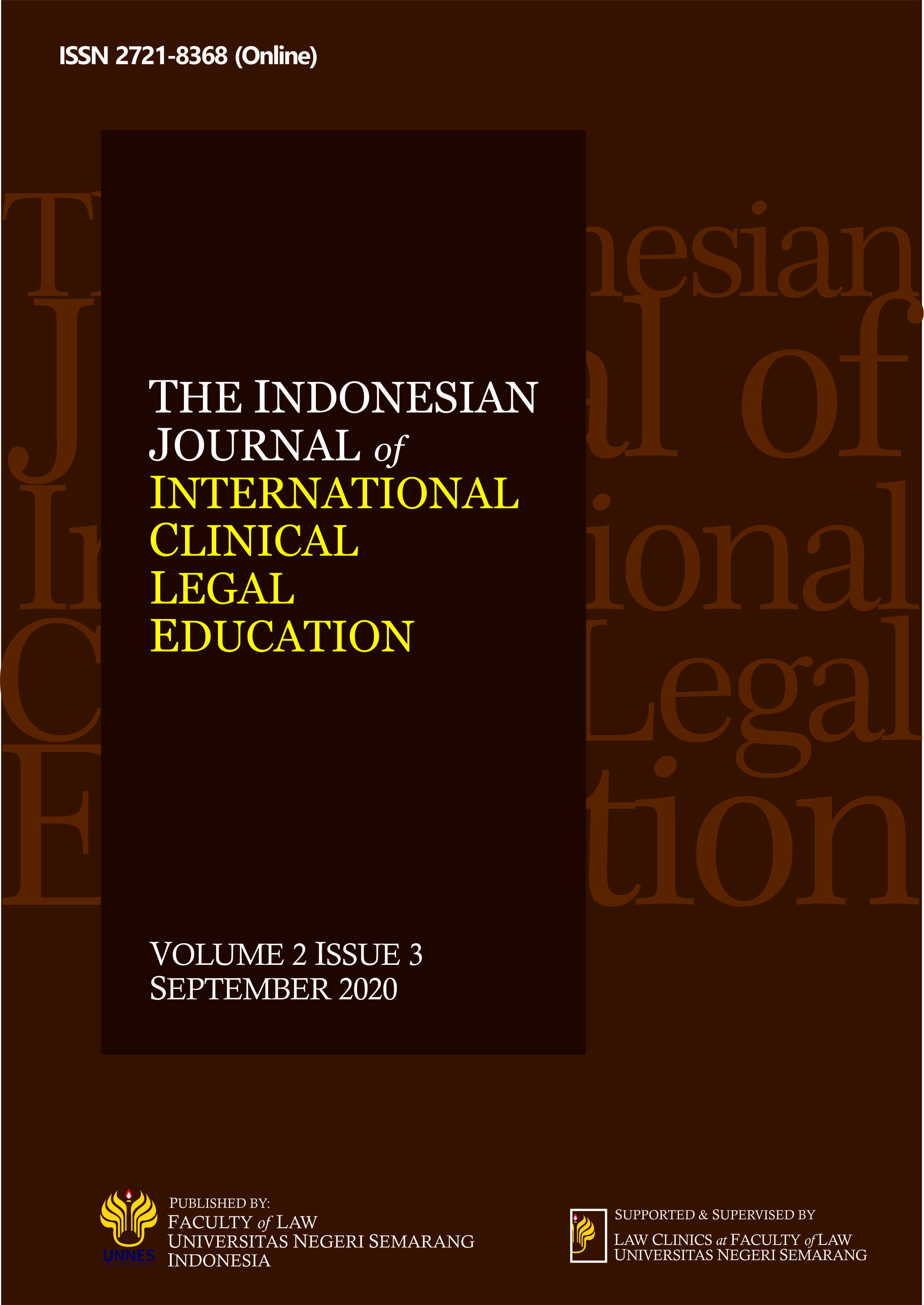Controversy over Corruption Inmate Release in the Midst of the Covid-19 Pandemic
Main Article Content
Abstract
Discourse on the release of prisoners in order to reduce the rate of transmission of the corona virus (Covid-19) is still a polemic. The policy is considered by some to be able to cause new problems, namely increasing crime rates. One such policy is to accelerate the release of prisoners and children through the crash of the integration rights program that has been running since last year. The basis is indeed stipulated in the Regulation of the Minister of Law and Human Rights No. 10 of 2020, Decree of the Minister of Law and Human Rights No.M.HH- 19 PK.01.04.04 Year 2020, and Director General of Corrections Circular Letter Number: PAS-497.PK.01.04.04 Year 2020.
Article Details

This work is licensed under a Creative Commons Attribution-ShareAlike 4.0 International License.
The copyrights of the article in Indonesian J. Int'l Clinical Leg. Educ. is on the Author(s), however, before publishing, it is required to obtain written confirmation from Author(s) in order to ensure the originality (Author Statement of Originality). The statement is to be signed by at least one of the authors who have obtained the assent of the co-author(s) where applicable. This work licensed under a Creative Commons Attribution-ShareAlike 4.0 International (CC BY-SA 4.0). All writings published in this journal are personal views of the authors and do not represent the views of this journal and the author's affiliated institutions.
References
Butt, S. (2011). Anti-corruption reform in Indonesia: an obituary?. Bulletin of Indonesian Economic Studies, 47(3), 381-394.
Christian Kamagi, T. (2019). Kajian Yuridis Tentang Pidana Penjara di Indonesia. LEX CRIMEN, 8(6).
Davidson, J. S. (2007). Politics-as-usual on trial: regional anti-corruption campaigns in Indonesia. The Pacific Review, 20(1), 75-99.
Hidayat, S. N., Karjoko, L., & Hermawan, S. (2020). Discourse on Legal Expression in Arrangements of Corruption Eradication in Indonesia. JILS (Journal of Indonesian Legal Studies), 5(2), 391-418.
Komalasari, K., & Saripudin, D. (2015). Integration of anti-corruption education in school's activities. American Journal of Applied Sciences, 12(6), 445.
Komariah, M. (2016). Integritas Penegak Hukum (Kepolisian, Kejaksaan, KPK) dalam Tindak Pidana Korupsi. Jurnal Ilmiah Galuh Justisi, 4(1), 76-91.
Marthaningtiyas, S. (2020). Implementasi Kebijakan Asimilasi Narapidana di Tengah Pandemi Covid-19. SUPREMASI: Jurnal Hukum, 3(1), 51-65.
Masyhudi, M. (2019). Membangun Sistem Integritas Untuk Pemberantasan Korupsi Dalam Sistem Peradilan Pidana Indonesia. Jurnal Hukum Ius Quia Iustum, 26(1), 44-66.
Millah, I. A. (2020). Penanggulangan Kejahatan Di Masa Pandemi Covid-19 (Dalam Perspektif Kriminologi Dan Viktimologi). Jurnal Komunikasi Hukum (JKH), 6(2), 497-513.
Moran, D., Jewkes, Y., & Lorne, C. (2019). Designing for imprisonment: Architectural ethics and prison design. Architecture Philosophy, 4(1), 67-81.
Ridwan, R. (2012). Membangun Integritas Penegak Hukum Bagi Terciptanya Penegakan Hukum Pidana Yang Berwibawa. Jurnal Media Hukum, 19(1).
Situmeang, S. M. T. (2020). Pembebasan Narapidana dalam Perspektif Konsep Asimilasi di Masa Pandemi Covid 19. JURNAL LITIGASI (e-Journal), 21(2), 220-237.
Swanda, I. M., & Nadiroh, U. (2018). The importance of anti corruption education teaching materials for the young generation. In Journal of Physics: Conference Series (Vol. 953, No. 1, p. 012167). IOP Publishing.
Tantaru, F., Toule, E. R. M., & Ubwarin, E. (2021). Kajian Sosio-Yuridis Pembebasan Bersyarat dan Pemberian Asimilasi Bagi Narapidana pada Masa Pandemi Covid-19 Ditinjau Dari Perspektif Tujuan Pemidanaan. SANISA: Jurnal Kreativitas Mahasiswa Hukum, 1(1), 34-41.
Zaidan, M. A. (2019). Sociological Approach to Eradication Corruption in Indonesia (Alternative to Imprisonment). The Indonesian Journal of International Clinical Legal Education, 1(1), 3-18.
